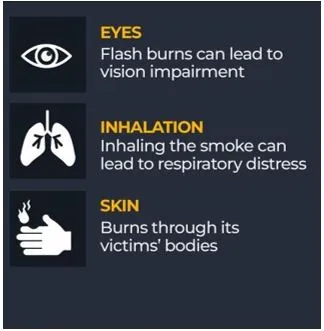

6th June 2024 (12 Topics)
About
A global human rights group accused Israel of using white phosphorus incendiary shells on residential buildings in conflict-hit southern Lebanon, possibly harming civilians and violating international law.
What is White Phosphorus?
- White phosphorus is a solid waxy substance that looks yellowish or colorless.
- It has a distinct garlic-like smell.
- Uses and Properties:
- White phosphorus ignites instantly when it touches oxygen.
- Militaries use it for lighting up battlefields, creating smoke screens, and as an incendiary.
- Once ignited, it's hard to put out, and it sticks to surfaces like skin and clothes.
- Health Risks: White phosphorus is harmful to humans in all forms of contact.
- Its smoke contains phosphoric acids and phosphine, which can harm the eyes and respiratory system.
- Contact with white phosphorus can cause deep and severe burns, even penetrating through bone.
- Ban: The incendiary substance is not banned, but its use in densely populated areas has been widely condemned.

International Law and White Phosphorus:
- While international law doesn't outright ban incendiary weapons like white phosphorus, its use in densely populated areas has been widely condemned.
- When white phosphorus is used as an incendiary weapon (not for chemical warfare), it's regulated by Protocol III of the Convention on Certain Conventional Weapons.
- Violation of the convention happens only if it's deliberately used as an incendiary weapon against humans in civilian areas like cities or residential areas.
Fact Box: Convention on Certain Conventional Weapons:
|


